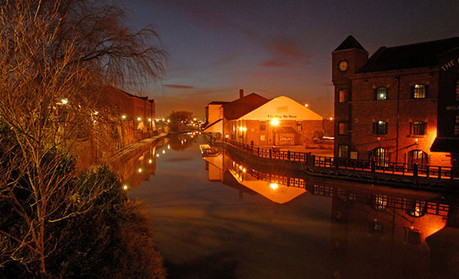
Wigan Pier today: Armstrong believes there are a lot of simliarities between Wigan's situation in the present and Orwell's time
Credit: Dave Green [CC-BY-SA-2.0], via Wikimedia CommonsIn 1937, George Orwell published The Road to Wigan Pier, a sociological investigation documenting his travels in the North of England to understand why the region's working-class population was so steeped in poverty.
Now, 75 years later, Guardian and Sunday Times journalist Stephen Armstrong has retraced the great author's steps in a bid to see whether the situation has improved, in his book The Road to Wigan Pier Revisited.
Armstrong told Journalism.co.uk what inspired him to look back at Orwell's findings and how he conducted the research.
"The idea came from a friend who held a series of focus groups before the 2010 general election looking at poverty and ethnicity in a number of cities Orwell visited.
"She came out of it thinking the white working-class people she met were in a worse situation than ethnic minorities in the area because, while they would have the same level of financial poverty, they didn't have the support of the Mosque or Christmas clubs where there was much stronger community spirit.
"That seemed to me to be something worth looking at and the more research I did, the more I found things were closer to the original situation found by Orwell. Things like benefit sanctions and zero-hours contracts and a whole swathe of new penalties and employment issues which came in over the last 10 years really did lead to massively increasing poverty."
It was observed by sociologist Seebohm Rowntree in 1950 that an expanding economy and redistribution of wealth after the second world war had all but eradicated poverty in Britain.
But Armstrong said his journey told a very different story after he tracked down three people directly connected with Orwell's original work.
"There's one chapter where I go to Wigan and find the sons of three people Orwell spoke to. Fortunately, Wigan has fought very hard to remain a part of Lancashire when it could easily have been swallowed up by Liverpool or Manchester.
"It has a strong web identity. There’s something called WiganWorld which is a very busy online chat forum for people in Wigan. The newspaper is very connected with the local community and they've got a very well-organised local archive and library so it's a town that's very interested in its own history.
"It took about six weeks in the end as there were lots of elements starting with the local paper and the chat forums before going to the library and meeting people – that’s how it developed."
Sid Smith, a newspaper seller, Gerry Kennan, a union organiser and Jim Hammond, a blacklisted communist miner were three of the people Orwell met during his travels.
Using the tools and information at his disposal, Armstrong was able to track down their sons to canvass their thoughts some 75 years on.
“I met Sid Smith's son whose father went on to build the largest independent retailer in the north West and his son Trevor Smith has since done very well and now owns a large house on the edge of Wigan. Jim Hammond's son Tony is now a retired judge and Gerry Kennan's son Harry followed in his father's footsteps as a unionist.
"There was this huge post-war upswing in the fortunes of the people that Orwell had specifically met. I remember meeting some 12-year-old kids in Scholes who were talking about what they wanted to do. One of them said he wanted to be a vet because the men on his estate bred dogs but for him to become a vet, he said he would need a wizard to wave a magic wand and cast a spell.
"Bearing in mind the cases of Tony Hammond and Trevor Smith, it feels like there was this build-up of potential, talent and opportunity, but these opportunities seem to be falling away now for people in areas like Scholes or parts of Liverpool, Sheffield and Barnsley where there was this huge upswing in what was possible and now that's gone away again."
Armstrong concluded by explaining the importance of maintaining the connections he made after the book was published, something Orwell failed to do.
"I think it’s really important. Orwell, having done the book, didn’t really go back to Wigan or have any contact with the town again. There is a sense he glided through so I wanted to try and make sure I didn’t do that.
"I've since been back to a community centre in Scholes and I'm helping out with some writing work. In places like that, there are people doing incredible things to help the community and you therefore feel inspired, almost duty-bound, to help out having written about it.
"If you just wander away again it seems a bit casual."
The Road to Wigan Pier Revisited was released on 8 March through Constable.
Free daily newsletter
If you like our news and feature articles, you can sign up to receive our free daily (Mon-Fri) email newsletter (mobile friendly).









